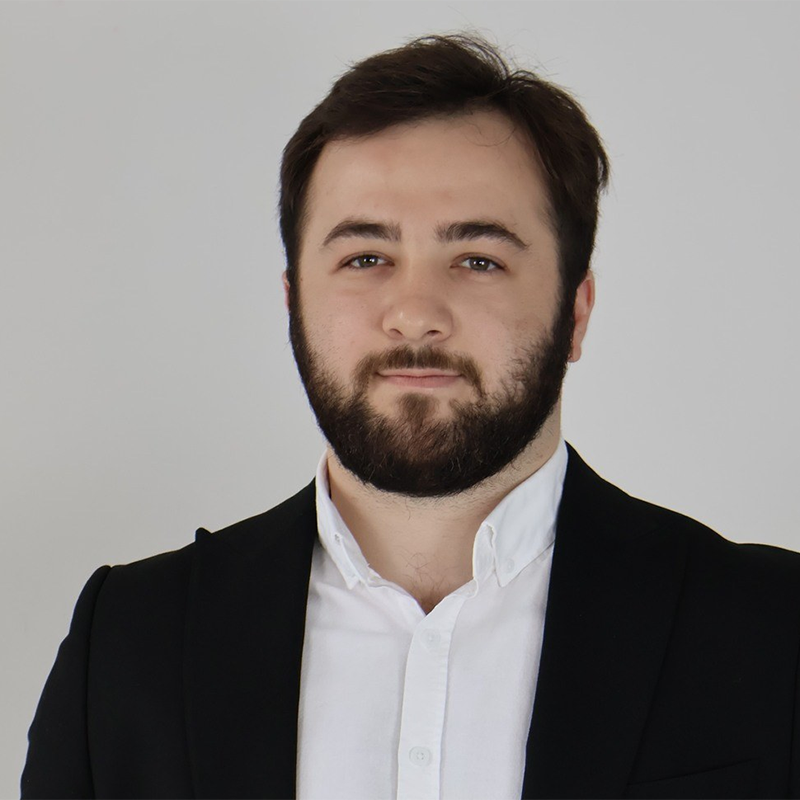
Georgia
Georgia
Georgia
Vasil Zhizhiashvili
Vasil Zhizhiashvili
Vasil Zhizhiashvili
Human rights lawyer and Program Director at the Georgian Democracy Initiative (GDI)
Human rights lawyer and Program Director at the Georgian Democracy Initiative (GDI)
Human rights lawyer and Program Director at the Georgian Democracy Initiative (GDI)

Georgia
Vasil Zhizhiashvili
Human rights lawyer and Program Director at the Georgian Democracy Initiative (GDI)
“We urgently need international pressure to repeal the foreign agent law and grant restrictions that suffocate civil society.”

VITA
Vasil Zhizhiashvili, born in 1999 in Tbilisi, Georgia, is a dedicated human rights lawyer and the Civil and Political Rights Program Director at the Georgian Democracy Initiative (GDI). With a bachelor’s degree in law from the Free University of Tbilisi and ongoing master’s studies in Public Law and Policy at Ilia State University, he has built a robust career in constitutional law and advocacy. Since 2019, Vasil has worked with GDI and the Georgian Young Lawyers Association, focusing on legal research, constitutional litigation, and protecting vulnerable groups. He also teaches human rights and constitutional law at the Free University of Tbilisi and the University of Georgia. He has been a member of the Georgian Lawyers Association since 2023.
What drives your commitment to human rights advocacy?
My passion for human rights stems from witnessing systemic injustices in Georgia. Growing up in a post-Soviet country, I saw how authoritarian tendencies silenced voices and eroded democratic values. At GDI, I lead efforts to protect those illegally arrested, tortured, or mistreated by police and defend journalists against SLAPP (Strategic Litigation Against Public Participation) lawsuits. My work is driven by a belief that everyone deserves a voice, especially marginalized groups like activists and independent media. Personal experiences of friends facing police brutality and the government's targeting of Non-Governmental Organizations (NGOs) fuel my resolve. I aim to uphold the rule of law and ensure accountability, even as we face repression. This commitment is both personal and professional – a fight for a free and just Georgia.
What impact does your organization’s work have, and who benefits from it?
GDI's work is critical in amplifying marginalized voices – activists, journalists, and citizens facing state oppression. We provide legal aid to those who have been detained or tortured illegally, ensuring that their rights are defended in court. Our advocacy against SLAPP cases protects independent media, preserving press freedom. Through legal research and public campaigns, we challenge authoritarian laws like the foreign agent law, which threaten civil society. Our efforts give a platform to those silenced by the government, fostering public awareness and pushing for systemic change. For instance, our litigation has secured releases for wrongfully detained protesters, and our reports influence international dialogue on Georgia's democratic backsliding. Every case we take strengthens the fight for human rights.

What specific challenges and risks do you face in your work?
The risks are immense. The recently enacted Georgian government's foreign agents law labels NGOs like GDI as foreign agents, threatening our operations and exposing us to arrests. We face constant intimidation, including surveillance and smear campaigns. The new law on grants restricts our funding, as we can’t access foreign support without government approval, crippling our resources. Our team has also faced legal persecution, with colleagues questioned by authorities. Digital attacks, like hacking attempts on our systems, are frequent. Despite these challenges, we persist, knowing our work challenges an increasingly authoritarian regime that seeks to silence dissent.
How do you maintain resilience amid these challenges?
Resilience comes from our collective commitment and strategic adaptation. We rely on a tight-knit team, sharing risks and supporting each other emotionally and professionally. Internationally, we collaborate with human rights networks to amplify our voice and secure moral support. We’ve diversified our advocacy, using public campaigns, legal challenges, and media to expose repression. Our legal background allows us to navigate oppressive laws creatively, finding loopholes to continue our work. Most importantly, the people we defend – their courage inspires us. Every small victory, like freeing a detainee, fuels our determination to keep fighting despite the government’s crackdowns.
What are your demands for protecting human rights defenders in Georgia, and what does the future hold?
We urgently need international pressure to repeal the foreign agent law and grant restrictions that suffocate civil society. Stronger protections for human rights defenders are essential, ending impunity for police violence, and ensuring fair trials. International organizations must sanction Georgian officials who target activists. Locally, we need legal reforms to safeguard NGOs and the media. The future depends on sustained international support and a shift in Georgia's political climate. If authoritarianism deepens, our work will face greater risks, but we're prepared to adapt. With global solidarity, we can push for a democratic Georgia where human rights thrive. Our resolve remains unshaken, driven by hope for justice.
Georgia
